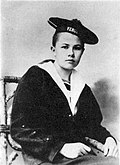Wikipedia:Today's featured article/requests/Isabelle Eberhardt
Isabelle Eberhardt[edit]
- This is the archived discussion of the TFAR nomination for the article below. Subsequent comments should be made on the appropriate discussion page (such as Wikipedia talk:Today's featured article/requests). Please do not modify this page.
The result was: scheduled for Wikipedia:Today's featured article/February 17, 2018 by Ealdgyth - Talk 17:00, 19 January 2018 (UTC)
Isabelle Eberhardt (17 February 1877 – 21 October 1904) was a Swiss explorer and writer. As a teenager, Eberhardt, educated in Switzerland by her father, published short stories under a male pseudonym. She became interested in North Africa, and was considered a proficient writer on the subject despite learning about the region only through correspondence. Eberhardt moved to Algeria in 1897, where she converted to Islam, dressed as an Arabic man and adopted a male name. Eberhardt's unorthodox behaviour made her an outcast to European settlers and the French administration. Her acceptance by the Qadiriyya, an Islamic order, convinced the French that she was a spy or an agitator. In 1901 she survived an assassination attempt. She was ordered to leave Algeria shortly thereafter, but was allowed to return the following year after marrying her long-time partner, an Algerian soldier. In 1904, aged 27, she was killed by a flash flood in Aïn Sefra. Her manuscripts were collected and published posthumously, receiving critical acclaim. She was subsequently considered among the best writers of literature inspired by Africa, and streets were named after her in Béchar and Algiers. (Full article...)
- Most recent similar article(s): Female person: Nancy Cartwright (October 25, 2017); Female writer: Kalki Koechlin (January 10, 2017)
- Main editors: Freikorp
- Promoted: June 18, 2017
- Reasons for nomination: Subject's birthday
- Support as nominator. Freikorp (talk) 09:35, 4 January 2018 (UTC)

